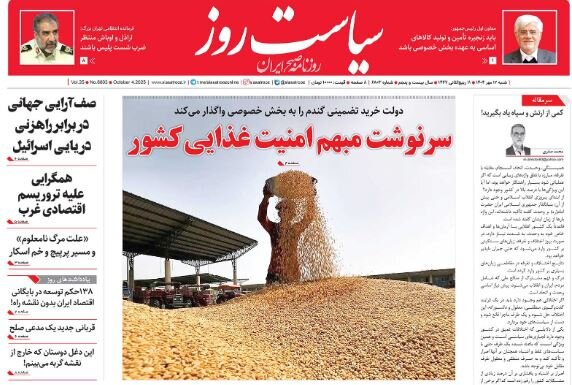Enemy error is synonymous with deadlier response

TEHRAN - In an analysis, Siasat-e-Rooz addressed the IRGC’s statement on the anniversary of Operation True Promise II and wrote: True Promise II was not only a severe punishment to the enemy’s aggression and crimes in the silence of the world’s indifferent assemblies, but also a clear message to the world and the evil Zionist regime that the era of costless threats has ended and any aggression will result in a regrettable response.
This operation, aimed at hitting the enemy’s strategic centers deep in the occupied territories, showed that Iran’s missiles and drones, that are a source of national security and dignity, have penetrated every defensive shield—including the Zionist regime’s multilayered defenses—and are striking targets with remarkable precision. On the occasion of the anniversary of this operation, the IRGC warned that any new error or aggression from the enemy camp will lead to a heavier, more precise, and more deadly response than True Promises; a response that will be able to bring the fake Zionist regime closer to the promised hell.
Shargh: Consensus of the East against the West
In a commentary, Shargh addressed Moscow’s harsh reaction to the three European countries’ action in restoring the sanctions resolutions adopted against Iran by the UN Security Council prior to the 2015 nuclear deal. The paper said: Maria Zakharova, spokesperson for the Russian Foreign Ministry, said this move lacks “legal validity.” From Moscow’s point of view, this European action has not only exacerbated the crisis of the legitimacy of the Security Council but also shown that the West is willing to ignore even its agreed-upon legal rules if they conflict with its political interests. Abbas Araghchi’s explicit letter to the UN Secretary-General, Mohammad Bagher Ghalibaf’s firm positions in the parliament, and the harsh statements of the Russian Foreign Ministry spokesman all indicate an Eastern consensus against the West that emphasizes that the recent Security Council decision not only lacks international legitimacy but also faces fundamental procedural flaws. What we are witnessing today is not simply the return of sanctions, but rather the emergence of a deep gap in the legal reading of international obligations and responsibilities; a gap where the West stands with the rhetoric of pressure and sanctions, but Iran and its partners emphasize the principles of national sovereignty and the invalidity of unilateral decisions.
Arman-e-Emrooz: Neighborhood policy, an opportunity or limitation?
In a note, Arman-e-Emrooz dealt with Iran's position in the region and its neighborhood policy. It wrote: Neighborhood policy can be both an opportunity and a limitation due to Iran’s specific geopolitical and geostrategic location. In terms of opportunity, Iran can use the neighborhood strategy to expand regional trade to partially compensate for the problems resulting from international sanctions. From a political point of view, constructive interaction with neighbors can increase Iran's bargaining power in the international system. On the other hand, sanctions and foreign pressure on neighboring countries prevent them from easily entering into extensive cooperation with Iran. Neighborhood policy has always been challenging for Iran. If it is accompanied by active diplomacy, tension management, trust-building, and targeted economic cooperation, it can serve as Iran's springboard in times of sanctions and pressure. But if it merely pays attention to competition and disputes, it will become a limitation rather than an opportunity. If some neighbors distance themselves from Tehran or show commitments to great powers, regional cooperation will certainly come under maximum pressure.
Hamshahri: Strategic partnership between Iran and Russia
Hamshahri examined the Iran-Russia Strategic partnership in an article and said: A new chapter opens in relations between Tehran and Moscow as the Iranian–Russian Treaty on Comprehensive Strategic Partnership went into force on October 2, 2025. The partnership includes a wide range of cooperation in various fields. Both sides emphasize that the partnership will pave the way for closer interaction on the international stage, especially in the context of the emergence of a multipolar world, and is defined under two basic policy priorities: “countering Western sanctions” and “shaping a new and just global order.” The strategic partnership articulates a willingness to cooperate, a security pact, a binding security commitment, and the development of multifaceted relations. Given the imposition of Western sanctions against Iran and Russia, the two countries have common goals in neutralizing the sanctions, which are pursued within the framework of developing economic, financial, and banking cooperation. Iran and Russia face common regional and international threats and challenges, and the "strategic treaty" is considered an appropriate framework for cooperation in this regard.
